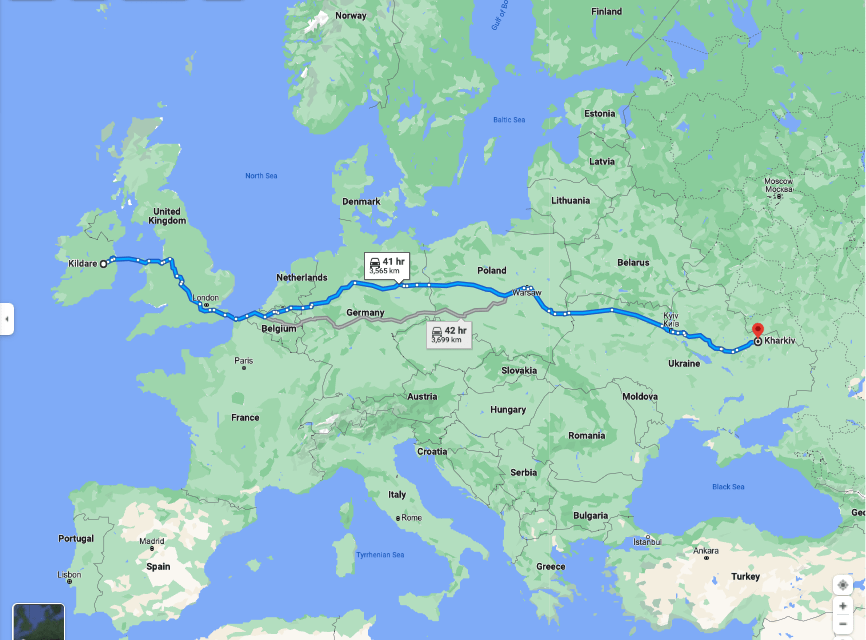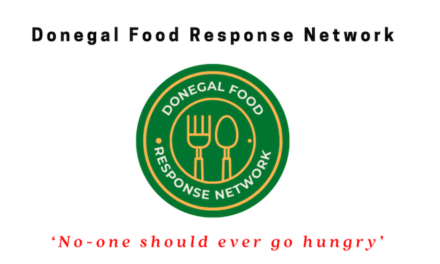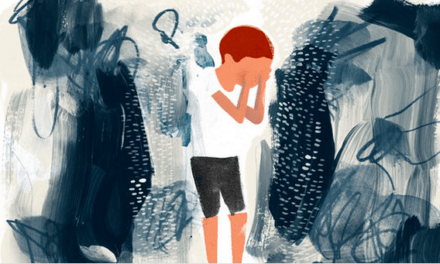‘Changing Ireland’ has followed a Kildare family over the weeks and now months as they have taken in refugees. A few others in the area have done likewise, but Matt – a dairy farmer in his early 50s – was the first to move and the first to take in refugees in his locality. He acknowledges other hosts might need cash, but said: “It would change it. That’s not why we are doing this.”
At the latest count, four Ukrainians – two of whom we spoke to – are settling into Matt’s home.
It’s a large, colonial-era, three-storey house with adequate spare rooms since siblings moved out years ago. Refugees staying in the area have now enrolled in local schools, registered with local doctors, been greeted by local community groups. Many are seeking work and they are becoming part of the local community. For instance, one woman who played violin professionally back home now plays in the local church.
Irish families offering homes were able to move at lightning speed compared to Government and even the Red Cross. Back in late February, Matt told me his ambitions.
“We have a big house and spare rooms and I was watching the news and made my mind up. I checked with Dad (his father Noel is in his 80s) and with Tom (Matt’s younger brother) to see if they were okay with us welcoming refugees. They were fine with it,” he said.
And so they set about refurbishing their spare rooms. “We want it to be nice for them,” he said in early March, with arrivals imminent. “We are in touch with a mother and her daughter who are still in Ukraine. There is also a family in Poland who could be here anytime soon.”
He found success by joining the Association of Ukrainians in the Republic of Ireland. “I also contacted the Irish Refugee Council and the Red Cross,” he said.
He was under no illusions.
“I hardly got any work done on the farm those first weeks. And this is not a short-term thing. These people could be with us for a long, long time, so it is not something you undertake lightly,” he said.
The mother and daughter he told me about in early March made it out of Ukraine and I met them two weeks after they moved into Matt’s house. Nadiya and her daughter Anna told us they did not see the atrocities others will have witnessed and they know they were lucky to get out early.
“I am an optimist,” said Nadiya from Kharkiv. “I see possibilities, but many will come with hatred and bitterness. It will be more difficult for them.”
MUM WOULD HAVE DONE THE SAME
“I am an optimist,” said Nadiya. “I try to see possibilities, but others who come here – especially after all the bombings they experienced – many will come with hatred and bitterness. It will be more difficult for them.”
When they reached Poland Nadiya and Anna heard through word of mouth about the farming family with whom they now live.
Matt was partly inspired by thinking of what his late mother would have done if she heard refugees were fleeing war for Ireland.
“She would have done the very same. I know she would have,” said Matt.
Now there are more Ukrainians living in their house than Irish.
A fortnight after the first two Ukrainians moved in, a third woman – a schoolfriend of Anna – joined them. They picked Yulia up from Shannon Airport on a Sunday night.
“The plane will be full of people fleeing,” said Matt, heading to the airport. “It is sad but most of them won’t know where they’re going to in Ireland and they won’t get to stay with a family.”
21 reasons why Ireland is BETTER today for taking in refugees – ON THE OTHER HAND…
SO FAR SO GOOD, BUT EARLY DAYS
A few days after they picked up Yulia, he reported: “She came with just a small shoulder bag. That was all. She seems to be settling in. Ask me again in a month’s time – that would be more realistic. But it is good for her and for Anna, they are glad to be reunited.”
RED CROSS DELAYS
He had plenty to say about those wishing to take in refugees who were stymied by delays at the Irish Red Cross.
“We registered with the Red Cross, but they never called. It was more word of mouth that worked for us. But I know three families around here who want to take people in and prefer to do it through the Red Cross – and they went weeks without hearing from them.”
I put questions from Matt, from his neighbours and from his Ukrainian guests to Minister of State for Rural and Community Development, Joe O’Brien (the video interviews are on our social media) and he was satisfied that the Red Cross had set targets and deadlines for calling all Irish families who wish to provide refuge. The wheels are now in motion.
RURAL YET CONNECTED
While rural life won’t appeal to everyone, this area is rural but not isolated. It is only three miles from the nearest big town – within easy reach of schools and public services.
NADIYA COOKING

• Nadiya has introduced the Kildare household to nettle soup and by the sound of things there won’t be a nettle left standing in Ireland for long, such is the Ukrainian grá for nettle soup.
Asked how they felt about living on a farm, Nadiya said they were city dwellers, but connected to nature.
“We are from Kharkiv, but we have a house in the country for holidays. Here, some evenings I cook Ukrianian dishes for Matt, Noel and Tom and they like it,” she said. She thinks their diet has improved since she arrived. She has introduced the Kildare household to nettle soup and by the sound of things there won’t be a nettle left standing in Ireland for long, such is the Ukrainian grá for nettle soup.
“Dad has bad hearing, but they’re actually after clicking,” said Matt.
WEATHER & WIFI
Do they complain about anything?
“They say the house is a bit cold,” said Matt. Hot water bottles and more storage heaters may be called for in wintertime. Yet their new home is far superior to an army tent or even a hotel room.
The internet connection is just adequate enough for Anna to continue with her graphic design studies through online classes – a silver lining from our years with Covid. Her mother is pleased that, despite being 3,700km from home, her daughter’s education was only briefly interrupted.
“One thing I have to do urgently is get better wifi,” said Matt. “They need good internet.”
And this kind Kildare family was not finished. They still had two vacant rooms and, a fortnight after Yulia’s arrival, a 29-year-old Ukrainian woman who did not know the other three joined them. She heard about Matt’s family purely through word of mouth. It is she who now plays violin in the local church and offers music classes.
Matt explained how she came here faster than government agencies could move: “We have been friends for years with a Polish woman and through her we got to know other Polish people, including a hairdresser whose cousin back in Poland was helping refugees as they crossed the border. I’m cutting a long story short, but that’s roughly how it worked – word of mouth.”
They were basically vouched for.
WORD OF MOUTH
Recently, a local priest called Matt to see had he room for a family looking for spare rooms but their needs proved greater than the old house could provide for. “Instead, through pure word of mouth they are going to my neighbour’s place. They had a stand-alone, refurbished house. It only took a few phone calls and they flew over and moved in.
“We’re just wanting to help. There’s no vetting, no nothing. It’s swift. I know the government have to do it their way, but it’s going to take forever,” he said.
Meanwhile, more neighbours wish to take in refugees and Matt has become in a matter of weeks a leading local volunteer organising accommodation for refugees and linking them to community, educational and state services. His background in the GAA helps.
However, when a friend suggested he go on KFM, Matt declined. “We don’t need publicity,” he said. “We just get on with it and we’re getting all the help we need.”
He commended community groups in the nearby town who have assisted the refugees staying in his home.
PAYING FAMILIES
He is opposed to the idea of paying households to host refugees. At €400 per month, his house could be in line for close to €5,000 per annum, or €20,000 if the payment was paid by the number of refugees hosted:
“It’s not the same. It would change it. That’s not why any of us are doing this.”
He nonetheless accepted that some families would find a payment helpful to cover transport costs, etc. Meanwhile, all Ukrainian refugees here are entitled to social welfare and can access jobs and public services as if EU citizens.
ADVICE TO OTHERS
He would naturally like to see more Irish people take in refugees: “An awful lot of Ukrainian families won’t find Irish families to go to. And they will hate being in hotels.”
He advises: “If you’re going to offer people a room, you’ve got to be 100% about it.
“It’s a long-term thing and it’s not for everyone. The first week it’s a big novelty, but remember Ukrainians are independent people. You have your own routine, your own ways in the kitchen. Now you have others sharing the kitchen. That won’t work in many families. But it’s working fine for us.”
* Some names have been changed in this story. Nobody in our Kildare household wanted publicity for doing something that many thousands of other Irish households are doing.





